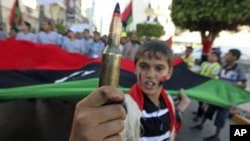Middle East analysts say the revolts across the region, which have become known as the Arab Spring, face an ominous future of violence and bloodshed.
The protests that quickly brought down presidents in Tunisia and Egypt prompted an exhilarating optimism among people in the Arab world where many have long suffered from repression under authoritarian rule.
However, as the demonstrations for freedom and democracy have spread to other countries, dictators seeking to hold onto power have used their militaries and massive detentions in an effort to suppress the unrest.
Dalia Ziada is an Egyptian human rights activist who directs the North Africa bureau of the American Islamic Congress. She says the euphoria that erupted after the ouster of Egyptian President Hosni Mubarak has turned to a deepening concern over where the region is headed.
“But now I think we are heading into some kind of summer, with all the heat and conflict and humidity and all the bad things associated with the word summer in the Arab world,” she said.
Ziada said she is concerned that the promises for democratic reform and a better future may not come soon enough to meet the high hopes generated by calls for political change.
“We have a big conflict between our hopes and our fears," she said. "We have very high expectations about what the revolution should bring us and I think we need, or the administration now in Egypt needs, some sort of management of expectations.”
Robin Wright is a journalist who has been writing about the Middle East since 1973.
Currently a senior fellow at the U.S. Institute of Peace, Wright said a major fear in the coming years is the potential for failed expectations of Arab populations seeking freedom and democracy.
“There is not a single government in the region that will be able to accommodate expectations, either economic or political anytime soon and probably for years to come," said Wright. "So the momentum I think that we have seen over the last few months will be very difficult to sustain. The post-rebellion letdown endangers real serious, further public discontent.”
In Libya, where leader Moammar Gadhafi is unleashing his military power on the civilian population, war continues to rage with an armed opposition fighting the government.
Protests continue across Yemen, as demonstrators keep up their demands for President Ali Abdullah Saleh to step down.
In Bahrain, with the help of foreign troops, the government has crushed demonstrations by the mainly Shi’ite Muslim majority, which led the revolt against the Sunni-led monarchy.
In Syria, President Bashar al-Assad has ordered tanks and troops to open fire on pro-democratic protestors and rounded up thousands of young men in an effort to suppress the revolt.
Amr al-Azm is a Syrian expert who grew up in Beirut and has lived in Damascus. Currently he is a professor of Middle East studies at Shawnee State University. Al-Azm calls the current situation in Syria “corrosive,” saying it will eventually lead to the end of the current government.
“Even if he succeeds in suppressing it for a while, even if he starts this so-called reform process it will fail and in so doing the regime is going to fail too. There is no return,” said al-Azm.
At a recent forum sponsored by the Washington Institute for Near East Policy, experts tried to predict what the region will look like five years from now. Martin Kramer is a senior fellow at the institute.
“As the era of dictators winds down, the likely outcome will be a mix of quasi-democratic practices with regionalism and sectarianism and even tribalism," he said. "Violence will be endemic and disaffected groups on the margins will seek to break away from ineffectual central governments.”
Analysts say the Middle East will become a far more complicated place for foreign policy than it was when dictators dominated their governments and in many cases enjoyed alliances with the West.
Robert Kagan, a senior fellow at the Brookings Institution, said, “Our binary view, and I think for the average American, it is pretty binary, where if you are a secular liberal in the Middle East we love you, if you are an Islamist we fear you. That is by necessity going to become a much more complicated story as Islamists take power in democratic settings.”
Analysts say it is likely to take years, decades or even a generation before the changes sweeping the Arab world possibly form a region that is more democratic and peaceful than the current transformation convulsing the Middle East.
Arab Spring Transforming Into Violent Summer
















